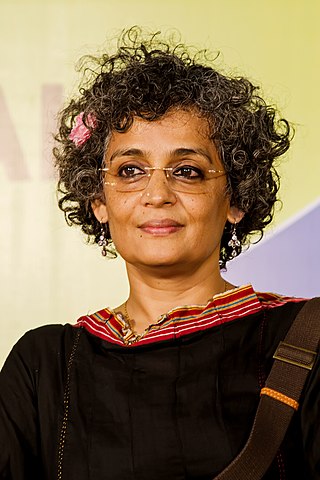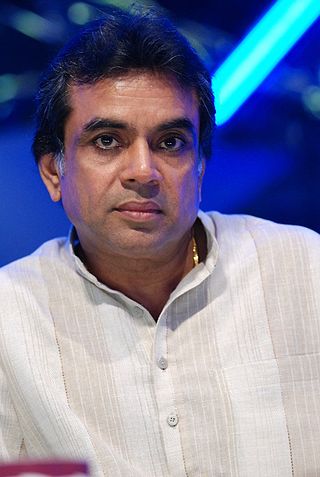Related Research Articles

Suzanna Arundhati Roy is an Indian author best known for her novel The God of Small Things (1997), which won the Booker Prize for Fiction in 1997 and became the best-selling book by a non-expatriate Indian author. She is also a political activist involved in human rights and environmental causes.

Shekhar Kulbhushan Kapur is an Indian filmmaker and actor. Born into the Anand-Sahni family, Kapur is the recipient of several accolades, including a BAFTA Award, a National Film Award, a National Board of Review Award and three Filmfare Awards, in addition to nomination for a Golden Globe Award.

In Which Annie Gives it Those Ones is a 1989 Indian English-language TV film written by Arundhati Roy and directed by Pradip Krishen. It stars Arjun Raina as the title character, with Roshan Seth and Arundhati Roy in key roles. The film also features Shahrukh Khan and Manoj Bajpayee, both then struggling actors in the Delhi theatre circuit, in small but significant roles. Set in the 1970s, in the National Institute of Architecture, New Delhi, the plot revolves around Anand Grover, known as Annie, a misguided visionary who gets into trouble for making fun of the principal, Y.D. Billimoria known as Yamdoot.

Victor Banerjee is an Indian actor who appears in English, Hindi, Bengali and Assamese language films. He has worked with great directors such as Roman Polanski, James Ivory, Sir David Lean, Jerry London, Ronald Neame, Satyajit Ray, Mrinal Sen, Shyam Benegal, Montazur Rahman Akbar and Ram Gopal Varma. He won the National Film Award for Best Supporting Actor for the film Ghare Baire. He was awarded the Padma Bhushan, India's third highest civilian award, in 2022 by the Indian Government in the field of art.

The Lawrence School, Lovedale, is a co-educational private boarding school located at Lovedale, which is a little town on the Nilgiri Mountains in the south Indian state of Tamil Nadu.

Paresh Rawal is an Indian actor, comedian, film producer and politician known for his works primarily in Hindi films. He has appeared in over 240 films and is the recipient of various accolades. In 1994, he won the National Film Award for Best Supporting Actor for his performances in the films Woh Chokri and Sir. For the latter, he received his first Filmfare Award for Best Performance in a Negative Role. This was followed by Ketan Mehta's Sardar, which saw him playing the lead role of freedom fighter Vallabhbhai Patel, a role that got him national and international acclaim. He was honoured with Padma Shri from the Government of India in 2014.
Pradip Krishen is an Indian filmmaker, naturalist and environmentalist. He has directed three films, Massey Sahib in 1985, In Which Annie Gives It Those Ones in 1989 and Electric Moon for Channel 4, UK in 1991. His films have won significant Indian and international awards, and In Which Annie Gives It Those Ones acquired cult status in the years after it was made. He is married to Arundhati Roy who also acted in his films but they currently live separately from each other. He subsequently gave up filmmaking, and since 1995, has worked as a naturalist and environmentalist.

Arundhati Nag is an Indian actress. She has been involved with multilingual Theatre in India, for over 25 years, first in Mumbai where she got involved with Indian People's Theatre Association (IPTA), and did various productions in Gujarati, Marathi, and Hindi theatre, and then in Kannada, Tamil, Malayalam and English, in Bangalore.

Tapan Sinha was one of the most prominent Indian film directors of his time forming a legendary quartet with Satyajit Ray, Ritwik Ghatak and Mrinal Sen. He was primarily a Bengali filmmaker who worked both in Hindi cinema and Bengali cinema, directing films like Kabuliwala (1957), Louha-Kapat, Sagina Mahato (1970), Apanjan (1968), Kshudhita Pashan and children's film Safed Haathi (1978) and Aaj Ka Robinhood. Sinha started his career in 1946, as a sound engineer with New Theatres film production house in Kolkata, then in 1950 left for England where he worked at Pinewood Studios for next two years, before returning home to start his six decade long career in Indian cinema, making films in Bengali, Hindi and Oriya languages, straddling genres from social realism, family drama, labor rights, to children's fantasy films. He was one of the acclaimed filmmakers of Parallel Cinema movement of India.

Ronit Bose Roy is an Indian actor, known for his works primarily in Hindi television and films, alongside a few Bengali, Tamil and Telugu cinema. Roy has earned numerous accolades in his career including a Filmfare Award, two Screen Awards, five ITA Awards, and six Indian Telly Awards.

Shaheed (transl. Martyr) is a 1965 patriotic film directed by S. Ram Sharma, produced by Kewal Kashyap and starring Manoj Kumar, Kamini Kaushal and Pran in lead roles. Iftekhar, Nirupa Roy, Prem Chopra, Madan Puri and Anwar Hussain star in supporting roles. It is based on the life of Bhagat Singh. The music was composed by Prem Dhawan, with several songs being penned by freedom fighter Ram Prasad Bismil. Shaheed was the first of Manoj Kumar's series of patriotic films, followed by the likes of Upkar (1967), Purab Aur Paschim (1970), and Kranti (1981).
The 54th National Film Awards, presented by Directorate of Film Festivals, the organisation set up by Ministry of Information and Broadcasting, India to felicitate the best of Indian Cinema released in the year 2006.

The 30th National Film Awards, presented by Directorate of Film Festivals, the organisation set up by Ministry of Information and Broadcasting, India to felicitate the best of Indian Cinema released in the year 1982. Ceremony took place in May 1983 and awards were given by then President of India, Giani Zail Singh.
The 40th National Film Awards, presented by Directorate of Film Festivals, the organisation set up by Ministry of Information and Broadcasting, India to felicitate the best of Indian Cinema released in the year 1992. Ceremony took place in 1993.
The 41st National Film Awards, presented by Directorate of Film Festivals, the organisation set up by Ministry of Information and Broadcasting, India to felicitate the best of Indian Cinema released in the year 1993. Ceremony took place in 1994.

General Bikram Singh, PVSM, UYSM, AVSM, SM, VSM, ADC is a retired Indian army officer who served as the 24th Chief of Army Staff (COAS) of the Indian Army. Previously the General Officer Commanding-in-Chief of the army's Eastern Command, he succeeded General V. K. Singh as COAS on May 31, 2012. He retired on 31 July 2014. He is the second Sikh to be COAS, the first having been General J. J. Singh. He was also the Chairman of the Chiefs of Staff Committee (CoSC) of the Indian armed forces.

Gunday (transl. Outlaws) is a 2014 Indian Hindi-language action drama film written and directed by Ali Abbas Zafar and produced by Aditya Chopra. The film features Ranveer Singh, Arjun Kapoor, Priyanka Chopra and Irrfan Khan in the lead roles. Set in 1971–1988 Calcutta, Gunday is a story about two best friends and outlaws, who fall in love with a cabaret dancer, which causes rivalry and misunderstandings between them while a police officer tries to take advantage of this situation to eliminate them.

Massey Sahib is a 1985 Hindi drama film directed by Pradip Krishen, starring Raghubir Yadav in the title role. It was Krishen's first film, and was an adaptation of Joyce Cary's 1939 novel Mister Johnson. It won Yadav two international acting awards. The film also stars Arundhati Roy, who was yet to write her first novel and win the Man Booker Prize, along with Barry John and Virendra Saxena.

Kann Sivanthaal Mann Sivakkum is a 1983 Indian Tamil-language film directed by debutant Sreedhar Rajan. Produced by R. Venkatraman, the film won the Indira Gandhi Award for Best Debut Film of a Director at the 30th National Film Awards in 1983. The film was based on Indira Parthasarathy's novel Kuruthipunal which won the Sahitya Akademi Award in 1977. It stars newcomer Vijaymohan and Poornima Jayaram, with Jaishankar, Rajesh, N. Viswanathan and Raveendran in pivotal roles. The film's score and soundtrack were composed by Ilaiyaraaja while cinematography was handled by Soumendu Roy.
Anurag Singh is an Indian documentary filmmaker known for his socio-political, human rights oriented films. He has worked with mass peoples’ movements, including the Narmada Bachao Andolan, National Campaign for People's Right to Information, and Mazdoor Kisan Shakti Sangathan His most famous films are "Kaise Jeebo Re", and "Right to Information", which have been screened and won awards internationally.
References
- ↑ McFarlane, Brian; Anthony Slide (2003). The encyclopedia of British film . Methuen. pp. 226. ISBN 0-413-77301-9.
- ↑ "Arundhati Roy: A 'small hero'". BBC News Online. 6 March 2002.
- ↑ "Electric Moon (1992)". British Film Institute Database. Archived from the original on 17 January 2009.
- ↑ "40th National Film Awards". International Film Festival of India. Archived from the original on 2 June 2016. Retrieved 2 March 2012.
- ↑ "40th National Film Awards (PDF)" (PDF). Directorate of Film Festivals . Retrieved 2 March 2012.
- ↑ McGirk, Jan (9 April 1997). "Goddess of Small Things". The Independent. London.
- ↑ Norton, James H. K. (2001). India and South Asia. Dushkin/McGraw-Hill. p. 172. ISBN 0-07-243298-5.
- ↑ Vir Singhvi (April 2005). "'I think from a very early age, I was determined to negotiate with the world on my own'". Rediff.com.
- ↑ "Cast". BFI Film database. Archived from the original on 1 February 2009.